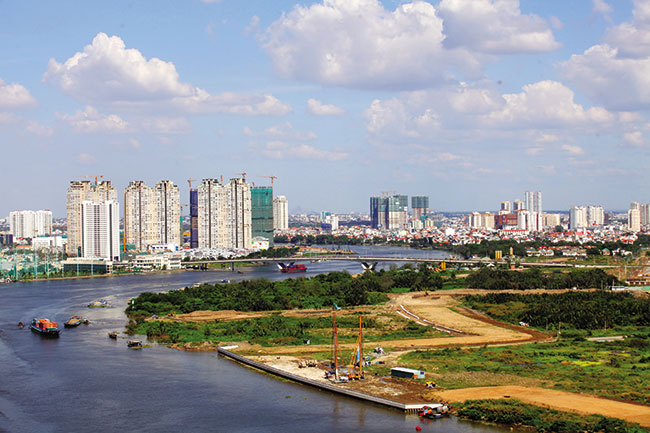Thu Thiem takes shape in south

Foreign investors are flocking to Thu Thiem as a prime development in Ho Chi Minh City
Nguyen The Minh, deputy head of the Thu Thiem New Urban Area Management Board, told VIR that the four main roads as well as the infrastructure in the residential area in the northern section of Thu Thiem Peninsula were on schedule for completion in 2017.
In 2016, the 9-hectare central square and the 20ha riverside park projects under the build-transfer (BT) model will start construction. The local authorities are also planning to build other bridges to connect Thu Thiem to Ho Chi Minh City’s centre and surrounding areas.
“In addition to Thu Thiem Bridge 1 and the tunnel under the Saigon River, which have connected the area with the centre of Ho Chi Minh City, a second bridge to Thu Thiem connected to the city centre is being constructed. Meanwhile, the Ho Chi Minh City Department of Transport is preparing to begin work on Thu Thiem Bridge 4 linking districts 7 and 2,” Minh added.
Thu Thiem has made significant progress, with developers clearly committed to implementing their projects according to a high standard.
Dai Quang Minh, a pioneer in developing the Thu Thiem New Urban Area, has invested in upgrading public infrastructure by building four main roads, the central square, and the riverside park. Under a build-transfer contract, the municipal authorities have granted land to the company in exchange for its investment.
In July 2015, Dai Quang Minh launched the first residential project, known as the Sala Urban Area, in Thu Thiem, marking a new milestone in the development. The company has sold 374 out of 414 apartments in the Sarimi project in 2015, while clients have made reservations for 70 per cent of the Sadora Apartment projects and 60 per cent of the Sarica Condominium project.
Meanwhile, a joint venture between Tien Phuoc JSC, Tran Thai Co. Ltd, and Denver Power Ltd (under Gaw Capital Partners) received an investment certificate in June 2015 to develop the Empire City complex, which is worth $1.2 billion.
The consortium is in the early stages of development, and has so far completed its 1/500 scale master plan. The 15ha area will consist of an 86-storey building, a 5-star hotel, a shopping mall, and an office building.
The Thu Thiem New Urban Area also received VND2 trillion ($88 million) from South Korean conglomerate Lotte and its Japanese partners Mitsubishi and Toshiba for The Eco Smart City, which is worth about $2 billion. The development is expected to feature luxury trade centres, hotels, office buildings, and apartments over a 10ha area.
Vingroup was also chosen to develop a sports and entertainment complex in Thu Thiem, while Quoc Loc Phat JSC is planning the Song Viet commercial complex, which has the total investment capital of over $310 million, and is scheduled to begin construction in 2016.
Neil MacGregor, managing director of Savills Vietnam, said that “We have seen a number of foreign investors including Lotte, Gaw Capital Partners, and GS E&C commit to Thu Thiem. We expect that the interest from foreign investors will continue into 2016 and 2017.”
McGregor added that the foreign investor interest in Thu Thiem was being driven by the fact that these investors had precious few viable projects on such a scale elsewhere in the city. For instance, although there are many foreign developers keen to develop projects in District 1, the land source in this area is either limited or comes with a huge price tag for land clearance. They have therefore turned their attention to areas adjacent to the central business district (CBD), or within commutable range – in this case, Thu Thiem.
Minh told VIR that Thu Thiem New Urban Area was being planned as a modern world-class city centre in Ho Chi Minh City. As such, the local government is calling for foreign investors in finance, banking, trade, and services to invest in it. However, many foreign companies that have visited the area are awaiting completion of the infrastructure before they will commit. To help entice those investors still sitting on the fence, the Vietnamese government will introduce preferential policies.
What the stars mean:
★ Poor ★ ★ Promising ★★★ Good ★★★★ Very good ★★★★★ Exceptional
Latest News
More News
- Site clearance work launched for Dung Quat refinery upgrade (February 04, 2026 | 18:06)
- Masan High-Tech Materials reports profit: a view from Nui Phao mine (February 04, 2026 | 16:13)
- Hermes joins Long Thanh cargo terminal development (February 04, 2026 | 15:59)
- SCG enhances production and distribution in Vietnam (February 04, 2026 | 08:00)
- UNIVACCO strengthens Asia expansion with Vietnam facility (February 03, 2026 | 08:00)
- Cai Mep Ha Port project wins approval with $1.95bn investment (February 02, 2026 | 16:17)
- Repositioning Vietnam in Asia’s manufacturing race (February 02, 2026 | 16:00)
- Manufacturing growth remains solid in early 2026 (February 02, 2026 | 15:28)
- Navigating venture capital trends across the continent (February 02, 2026 | 14:00)
- Motivations to achieve high growth (February 02, 2026 | 11:00)
















 Mobile Version
Mobile Version